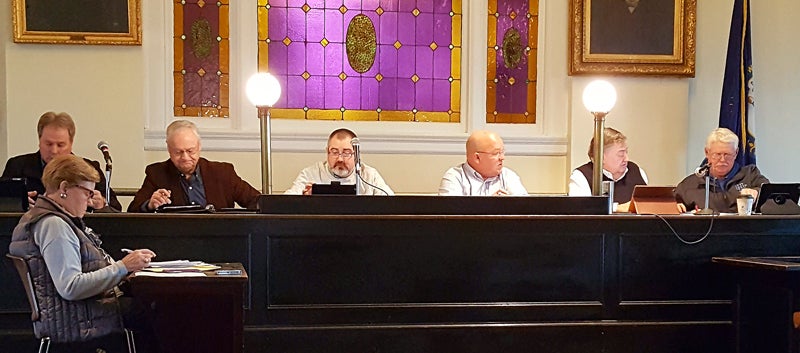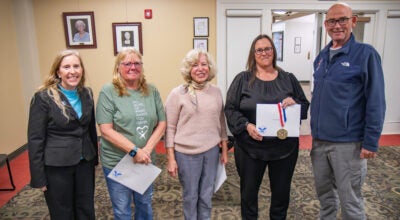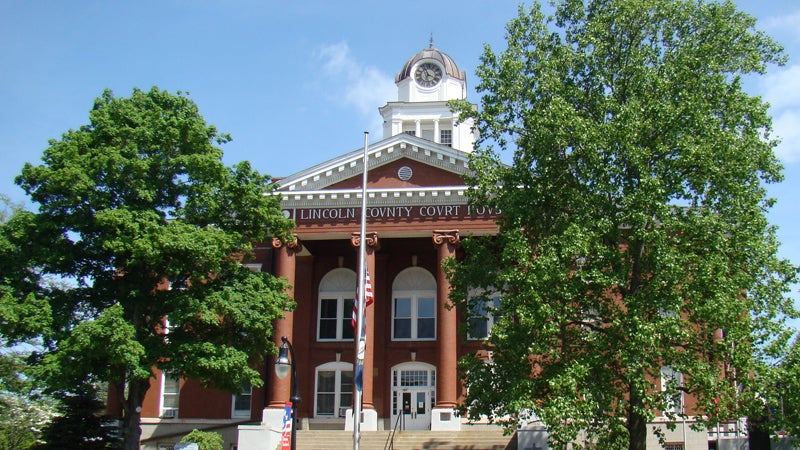Fiscal court plans for uncertain future of 911 funding
Published 5:30 am Thursday, March 22, 2018

- File Photo by Abigail Whitehouse The Lincoln County Fiscal Court gathers for a regular meeting.
STANFORD — With water meter fees tied up in court once again, the Lincoln County Fiscal Court is discussing alternative ways to fund the county’s 911 services.
There were four proposals discussed during the Tuesday morning fiscal court meeting this week, as magistrates reviewed a packet of information, which included call volumes for emergency agencies over the last year, as well as a breakdown of Bluegrass 911 income.
According to the documentation, Bluegrass 911 received $475,420 from Lincoln County during fiscal year 2016-17, with $210,761 of that coming from landline phone fees, $175,403 coming from the state Commercial Mobile Radio Service (CMRS) cell phone tax, $36,559 coming from grant funding and $52,697 coming from the Lincoln County Fiscal Court.
Lincoln County Attorney Daryl Day estimated Lincoln County’s total will be about $525,000 this year, based on the Bluegrass 911 budget. Since Bluegrass 911 also serves Garrard County, Day said he estimates Lincoln County’s portion of the budget is about 55 percent, based on the population of the two counties.
The four proposals discussed Tuesday were calculated separately based on both the $475,000 and $525,000 figures and each spreads the cost of 911 across incorporated cities, as well as individual agencies that use the service, including Lincoln County EMS, Lincoln County Fire Protection District, Lincoln County Sheriff’s Office and Lincoln County Emergency Management.
Based on the projected $525,000 total, the first proposal would keep the $4 per month landline fee in place and include CMRS funding, which leaves approximately $120,000 in additional funding needed – an amount that is likely to increase each year. Each agency, government body would pay a percentage of the $120,000 based on their percentage of the total call volumes.
Under that proposal, the sheriff’s office would be responsible for the highest percentage and owe approximately $48,140. The City of Stanford would be responsible for the second-highest percentage and owe a total of $44,520. Crab Orchard would owe $1,415 and Hustonville would owe $800.
The second proposal includes CMRS funding but removes the landline phone fee, leaving about $350,000 in additional funding needed.
The third proposal removes the landline phone fee and fiscal court contribution but retains CMRS funding and imposes a $25 fee on every parcel of land in Lincoln County to cover the $350,000 in additional funding that would be needed.
Day estimated Lincoln County has a total of 16,180 parcels and a $25 fee on each would generate $404,500.
“If this method is chosen, the fee per parcel needs to be high enough to cover for those parcels that do not pay their taxes,” the document states. “This fee would be added to tax bills.”
The fourth proposal suggests imposing a fee of $20 on parcels outside of cities to cover the costs of 911 service in unincorporated areas. Incorporated cities would be responsible for funding their respective portions of 911 costs.
This proposal also removes the landline fee and fiscal court contribution, while keeping CMRS funding in place.
With 13,493 parcels outside of cities, a $20 fee on each would generate approximately $269,860 and would fund the $213,260 total needed to cover 911 costs for Lincoln County EMS, fire, emergency management and the sheriff’s office.
A second version of proposal no. 4 excludes Lincoln County EMS and the Lincoln County Fire Department and brings the total needed to fund 911 services for the sheriff’s office and emergency management down to $142,110.
Day also calculated parcel fees for each city based on the total number of parcels inside city limits and each city’s percentage of 911 costs.
Stanford’s parcel fee for the 1,884 parcels in city limits would have to be $70 and would generate approximately $131,880. Crab Orchard would need to impose a $10 fee on it’s 495 parcels to generate $4,950 and Hustonville would need to impose a $10 fee on the 266 parcels inside the city to generate $2,660.
Magistrates discuss options
While magistrates still agree the $4 fee on water meters would be the fairest way to fund 911 services, the current litigation has forced them to look at other options.
Last week, the cities of Stanford, Crab Orchard and Hustonville filed a joint lawsuit, questioning the fiscal court’s legal authority to force water companies to collect the fees on water meters.
“Nothing could be more fair than the water meters, but they have pushed back,” said Magistrate David Faulkner. “We can’t wait (through) two to three years of litigation like we did. This all started in 2012. We have to make some kind of decision. I want to make a decision at the next meeting and give them time to figure out how they’re going to pay their share, whatever that be…”
Faulkner said the fiscal court has no control over the fees on cellphones, which the state collects and distributes.
“I would love to help the businesses by taking the landline fees off, and the elderly, the ones who keep their phones,” he said.
Faulkner said the most important thing to remember is that the fiscal court would not receive a penny of the proposed water meter fees — it would all go to Bluegrass 911 to fund the county’s 911 services.
“The truth of the matter is, the city (Stanford) water company pushed back, the mayor agreed and got the council to agree with him and their agenda is we’re not giving them enough money, they didn’t make enough money keeping three percent,” Faulkner said. “So they do have an agenda, just like we do. Theirs is turning into a commercial endeavor, a revenue producer for them, and ours is to keep the 911 funding open and running, with no revenue.”
Magistrate Lonnie Pruitt said when he was a child there was no centralized 911 phone number to call.
“We had numbers all over the refrigerator that you had to remember to call and we’ve come a long way,” Pruitt said. “I’m sure that when they first did it and they put it on the landlines, people probably threw a fit then too, because they really don’t want anything to go up, and like David (Faulkner) said, we don’t want to take people’s money. But 911 is so important and we’re having to fight the people that we do things for.”
Pruitt said raising the landline fees just puts pressure on a few, rather than spreading the cost across the county.
“What’s right is right. Right now the fairest is to put it on the water meters,” he said.
Magistrate Joe Stanley asked if it would be beneficial to sit down with the mayors of each city to discuss things further.
Day said before setting up a meeting like that, he would need to contact the attorney representing the county in the ongoing litigation and see how he feels about it.





